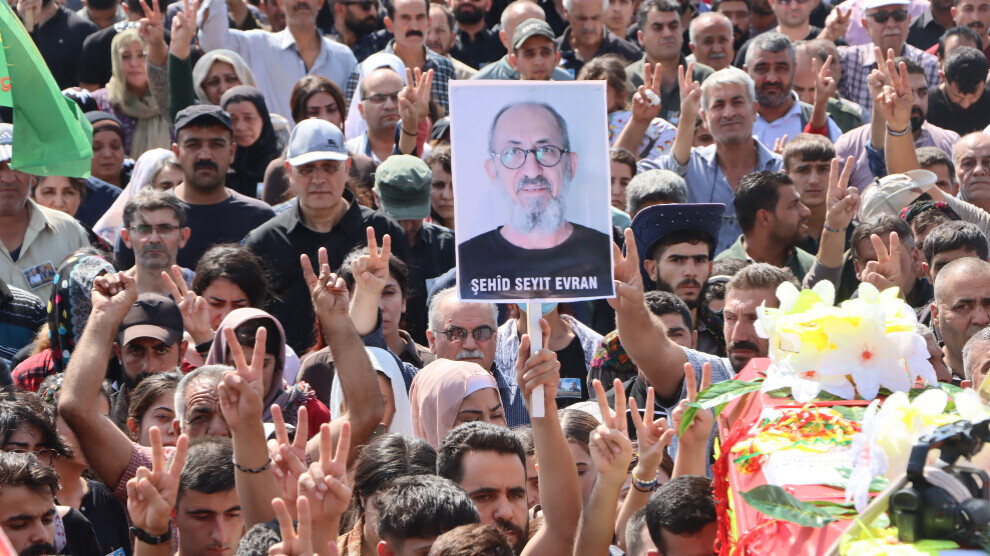Thousands of people from different places in the autonomous region of Northern and Eastern Syria attended the funeral of Seyit Evran and Aslan Qamişlo and paid their last respects to the two Kurdish revolutionaries on Wednesday. Journalist Seyit Evran died of heart failure on 22 September, while YPG commander Aslan Qamişlo was killed in a Turkish drone attack on 17 September. Both were from Northern Kurdistan and were part of the Kurdish liberation movement for over thirty years. Representatives of civilian and military institutions of the Autonomous Administration of North and East Syria (AANES), Kurdish and Arab tribes and political parties, as well as thousands of other companions of the two martyrs attended the funeral at the Şehîd Delîl Saroxan Cemetery of Martyrs in Qamishlo.
The coffins, decorated with flowers and flags of the YRA (Free Media Association) and YPG (People’s Defense Units), were carried from the Enteriyê neighbourhood to the cemetery. The funeral ceremony began with a minute of silence in memory of the two freedom fighters. Speeches paid tribute to Seyit Evran and Aslan Qamişlo's many years of service to the liberation movement.
The co-chair of the Movement for a Democratic Society (TEV-DEM), Rûken Ehmed, said in a speech: "The fact that so many people are gathering around the martyrs means that the revolution will achieve its goal. Because our party is the party of the martyrs. Our people will not bow to oppression and occupation. The Kurdish identity has been protected by the fighters of the philosophy of Abdullah Öcalan."
Rûken Ehmed continued: “Seyit Evran led this struggle with his pen and his camera and became the voice of Kurdistan with his journalistic and writing work. He was combative and did not let himself be stopped, even under very difficult circumstances. He told the world about the struggle of the Kurdish people and the brutal face of the Turkish state. He reported the truth, and he taught this principle to many more media workers."
Paying tribute to Aslan Qamişlo, Rûken Ehmed said: "Martyr Aslan was known for his modesty, selflessness and laughter in the revolution in North-East Syria. He worked in various fields and campaigned for education, defence and on social issues. With great love and conviction, he fought in Rojava and all areas of North-East Syria to organise the revolutionary people's war and self-defence."
Remarking that solidarity with the martyrs requires not to give any opportunity to betrayal, Rûken Ehmed stated: "This is the responsibility of all of us. The burden must not be only on the shoulders of the security forces and the SDF. We must chase the traitors out of the country. If we succeed, we will show the strength of an organised people. Those who love their country must not leave it and must resist all forms of special warfare. We believe in the strength of our people. We must educate our children according to our principles. Even if we fall for it, we will continue to organise and thwart the machinations seeking to drive a wedge between the people and the autonomous administration."
In the name of the Free Media Association (Yekîtiya Ragihandina Azad - YRA), Seyit Evran's long-time companion Stêrk Gulo gave a speech in which she commemorated all the martyrs of the freedom movement: "When we speak of the martyrs, we speak of the struggle. It is very serious. Şehîd Seyid has been my companion for 30 years, and Şehîd Aslan for 25 years. We cannot do justice to the martyrs if we only talk about them."
Regarding Seyit Evran, Stêrk Gulo said: "Seyit loved the people of Rojava, Bakur, Bashur and Rojhilat. He said what he had to say. He ran from Zap to Qandil and from there to the Zagros. He was a fighter, a commander and a journalist who did not deviate from the path of truth for a single day. When the revolution started in Rojava, he came here with his pen and camera and tried to make the voice of his people heard in the world. Through his texts and his recordings, we have met thousands of friends and martyrs. He knew the whole history of Rojava because he was in love with his people. For us, he was a living archive. We will let him live on with our pens and cameras, with great love and perseverance."
After the speeches, the certificates of the martyrs were read out and the bodies of Seyit Evran and Aslan Qamişlo were buried.















